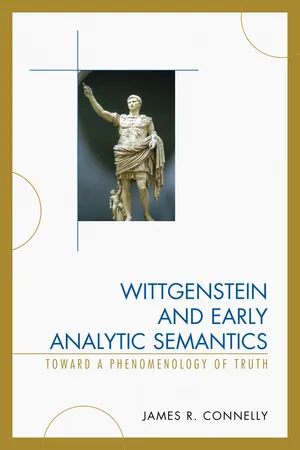
- English
- ePUB (mobile friendly)
- Available on iOS & Android
eBook - ePub
About this book
This book assesses the respective prospects of two competing methodological approaches to the study of meaning and communication, as well truth and inference, each figuring prominently within the analytic tradition of philosophy of language.
The first, 'logistical' approach is characterized by the employment of de-compositional logical analysis designed to resolve various theoretically problematic semantic and logical puzzles.The representative proponents of this approach are the three great early analytic philosophers (Frege, Russell, and the early Wittgenstein).
The second, 'phenomenological' approach, by contrast, instead advocates careful inspection and detailed description of our actual linguistic practices, along with general features of the ordinary circumstances, and lived experiences, in which they are situated. The aim of such description is then to dissolve the aforementioned puzzles by showing them to derive from key misunderstandings of these practices and circumstances. The principle proponent here is the later Wittgenstein.
Expanding upon the work of the later Wittgenstein, this book argues that considerations regarding the nature of following a rule, and deriving from the impossibility of private languages, decisively recommend the phenomenological over the logistical methodology, in particular because these considerations demand that we identify linguistic meanings with the disciplined uses of words within public, and proto-typically social, linguistic practices.
The first, 'logistical' approach is characterized by the employment of de-compositional logical analysis designed to resolve various theoretically problematic semantic and logical puzzles.The representative proponents of this approach are the three great early analytic philosophers (Frege, Russell, and the early Wittgenstein).
The second, 'phenomenological' approach, by contrast, instead advocates careful inspection and detailed description of our actual linguistic practices, along with general features of the ordinary circumstances, and lived experiences, in which they are situated. The aim of such description is then to dissolve the aforementioned puzzles by showing them to derive from key misunderstandings of these practices and circumstances. The principle proponent here is the later Wittgenstein.
Expanding upon the work of the later Wittgenstein, this book argues that considerations regarding the nature of following a rule, and deriving from the impossibility of private languages, decisively recommend the phenomenological over the logistical methodology, in particular because these considerations demand that we identify linguistic meanings with the disciplined uses of words within public, and proto-typically social, linguistic practices.
Frequently asked questions
Yes, you can cancel anytime from the Subscription tab in your account settings on the Perlego website. Your subscription will stay active until the end of your current billing period. Learn how to cancel your subscription.
No, books cannot be downloaded as external files, such as PDFs, for use outside of Perlego. However, you can download books within the Perlego app for offline reading on mobile or tablet. Learn more here.
Perlego offers two plans: Essential and Complete
- Essential is ideal for learners and professionals who enjoy exploring a wide range of subjects. Access the Essential Library with 800,000+ trusted titles and best-sellers across business, personal growth, and the humanities. Includes unlimited reading time and Standard Read Aloud voice.
- Complete: Perfect for advanced learners and researchers needing full, unrestricted access. Unlock 1.4M+ books across hundreds of subjects, including academic and specialized titles. The Complete Plan also includes advanced features like Premium Read Aloud and Research Assistant.
We are an online textbook subscription service, where you can get access to an entire online library for less than the price of a single book per month. With over 1 million books across 1000+ topics, we’ve got you covered! Learn more here.
Look out for the read-aloud symbol on your next book to see if you can listen to it. The read-aloud tool reads text aloud for you, highlighting the text as it is being read. You can pause it, speed it up and slow it down. Learn more here.
Yes! You can use the Perlego app on both iOS or Android devices to read anytime, anywhere — even offline. Perfect for commutes or when you’re on the go.
Please note we cannot support devices running on iOS 13 and Android 7 or earlier. Learn more about using the app.
Please note we cannot support devices running on iOS 13 and Android 7 or earlier. Learn more about using the app.
Yes, you can access Wittgenstein and Early Analytic Semantics by James Connelly in PDF and/or ePUB format, as well as other popular books in Philosophy & Analytic Philosophy. We have over one million books available in our catalogue for you to explore.
Information
Table of contents
- Cover-Page
- Halftitle
- Part I: The Semantic Problematic of Early Analytic Philosophy
- Part II: Normativity and Method in Wittgenstein’s Philosophical Investigations
- Bibliography
- Index
- About the Author